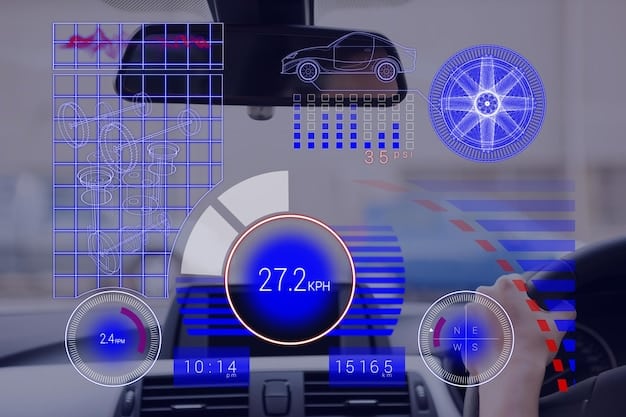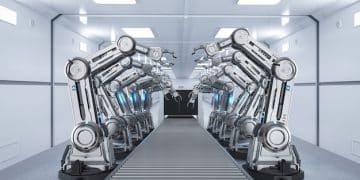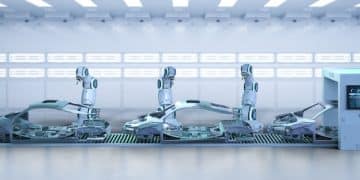AI in Automotive: Enhancing Safety and Performance in Modern Vehicles

Automakers are increasingly leveraging artificial intelligence to enhance vehicle safety and performance through advanced driver-assistance systems, predictive maintenance, and improved manufacturing processes, leading to safer roads and more efficient vehicles.
The automotive industry is undergoing a significant transformation, driven by advancements in artificial intelligence. But how are automakers using artificial intelligence to improve vehicle safety and performance? Let’s delve into the ways AI is reshaping the future of driving.
How are Automakers Utilizing AI for Enhanced Safety?
Automakers are heavily investing in artificial intelligence to enhance vehicle safety. AI algorithms are used to analyze data from various sensors, such as cameras, radar, and lidar, to provide drivers with real-time alerts and assistance. This not only enhances driver awareness but also helps in preventing accidents by intervening when necessary.
Advanced Driver-Assistance Systems (ADAS)
Advanced Driver-Assistance Systems (ADAS) are a prime example of AI in action. These systems use AI to offer features like adaptive cruise control and lane keep assist.
Collision Avoidance Systems
AI-powered collision avoidance systems are designed to detect potential collisions and take corrective action, such as applying the brakes or steering the vehicle to safety.
- AI analyzes sensor data to predict potential collisions.
- Systems provide alerts to the driver and can initiate braking.
- AI adapts to different driving conditions to improve accuracy.

These sophisticated safety nets are constantly evolving, incorporating more advanced machine learning techniques to better anticipate and mitigate risks on the road. The ongoing refinement of these systems promises to significantly reduce the number of accidents caused by human error, making driving safer for everyone.
Improving Performance Through AI-Driven Vehicle Dynamics
AI also plays a crucial role in enhancing vehicle performance by optimizing various aspects of vehicle dynamics. By analyzing vast amounts of data, AI algorithms can fine-tune vehicle settings in real-time to improve handling and stability. This not only enhances the driving experience but also contributes to increased safety.
Adaptive Suspension Systems
Adaptive suspension systems use AI to adjust the suspension settings based on road conditions and driving style, providing a smoother and more controlled ride.
Torque Vectoring
AI-driven torque vectoring systems optimize the distribution of power to the wheels, enhancing traction and cornering performance.
- AI analyzes sensor data to detect changes in road conditions and driving behavior.
- Systems adjust suspension settings and torque distribution in real-time.
- Improved handling and stability contribute to increased safety.
The use of AI in vehicle dynamics allows for a highly personalized and optimized driving experience, adapting to individual preferences and ensuring peak performance in any situation. These systems continuously learn and improve, leveraging data to enhance responsiveness and control, ultimately resulting in a safer and more enjoyable drive.
Predictive Maintenance: AI’s Role in Long-Term Reliability
Beyond immediate safety and performance enhancements, AI is also transforming vehicle maintenance. Predictive maintenance uses AI algorithms to analyze vehicle data and predict potential maintenance needs before they become critical issues. This proactive approach helps prevent breakdowns and extends the lifespan of the vehicle.
Real-Time Monitoring
AI systems monitor vehicle components in real-time, analyzing data to detect anomalies that could indicate future problems.
Data Analysis and Alerting
By analyzing historical data and identifying patterns, AI can predict when a component is likely to fail.
- AI analyzes sensor data to detect potential issues.
- Systems provide alerts to the driver or service center about upcoming maintenance needs.
- Predictive maintenance prevents breakdowns and increases vehicle lifespan.

Predictive maintenance is revolutionizing how vehicles are cared for, shifting from reactive repairs to proactive prevention. This not only saves vehicle owners time and money but also ensures that vehicles remain in optimal condition, enhancing both safety and performance over the long term.
AI-Powered Manufacturing: Ensuring Quality and Precision
Artificial intelligence is also revolutionizing the manufacturing processes within the automotive industry. AI-powered systems are used to monitor quality control, optimize production lines, and detect defects with greater accuracy than traditional methods. This leads to more reliable vehicles and a higher overall standard of manufacturing.
Quality Control Systems
AI algorithms are used to analyze images and sensor data to identify defects and ensure that vehicles meet stringent quality standards.
Robotics and Automation
AI-powered robots automate repetitive tasks on the production line, increasing efficiency and reducing the risk of human error.
- AI systems monitor quality control processes in real-time.
- Defects are detected more accurately and efficiently.
- Robotics and automation improve production efficiency.
AI is transforming automotive manufacturing by enhancing precision, reducing waste, and ensuring consistent quality. This ultimately translates into vehicles that are more reliable, safer, and built to higher standards, reflecting the significant impact of AI across the entire production spectrum.
The Ethical Considerations of AI in Automotive
As AI becomes more prevalent in automotive technology, ethical considerations become increasingly important. Automakers must address issues such as data privacy, algorithmic transparency, and the potential for bias in AI systems. Ensuring that AI is used responsibly and ethically is crucial for building trust and maintaining public confidence in the technology.
Data Privacy
Automakers must protect driver data and ensure that it is used responsibly and ethically.
Algorithmic Transparency
Ensuring transparency in how AI algorithms make decisions is crucial for building trust.
- Addressing ethical concerns is crucial for building trust in AI.
- Data privacy, algorithmic transparency, and bias are key considerations.
- Ethical AI development promotes responsible innovation.
Navigating the ethical landscape of AI in automotive requires careful consideration of potential impacts and a commitment to responsible development. By prioritizing transparency, fairness, and data security, automakers can foster trust and ensure that AI technologies are used for the benefit of society.
Future Trends: The Continued Evolution of AI in Vehicles
The future of AI in automotive technology is filled with exciting possibilities. From fully autonomous vehicles to personalized driving experiences, AI is poised to transform every aspect of driving. Continued innovation and development will undoubtedly lead to even safer, more efficient, and more enjoyable vehicles.
Autonomous Driving
AI is the foundation for fully autonomous vehicles, which promise to revolutionize transportation.
Personalized Driving Experiences
AI will enable vehicles to adapt to individual driver preferences and needs, creating a more personalized driving experience.
- Autonomous vehicles promise to transform transportation.
- AI will enable personalized driving experiences.
- Continued innovation will drive further advancements in safety and performance.
As AI technology continues to advance, the automotive industry will see even greater integration of AI in various aspects of vehicle design, functionality, and usage. This will not only enhance the driving experience but also contribute to creating safer, more sustainable, and more connected transportation systems for the future.
| Key Point | Brief Description |
|---|---|
| 🛡️ Enhanced Safety | AI-driven ADAS features reduce accidents and enhance driver awareness. |
| 🏎️ Improved Performance | AI optimizes vehicle dynamics for better handling and stability. |
| 🔧 Predictive Maintenance | AI predicts maintenance needs, preventing breakdowns and extending vehicle life. |
| 🏭 Quality Manufacturing | AI enhances quality control and automates production for higher reliability. |
Frequently Asked Questions (FAQ)
▼
AI enhances vehicle safety through advanced driver-assistance systems (ADAS) that provide real-time alerts and assistance, helping to prevent accidents by intervening when necessary. It analyzes data to predict potential collisions.
▼
Predictive maintenance uses AI to analyze vehicle data, predicting maintenance needs before they become critical issues. This helps prevent breakdowns, extends vehicle lifespan, and ensures optimal vehicle condition.
▼
AI enhances vehicle performance by optimizing vehicle dynamics. It can adjust suspension settings based on road conditions and driving style, improving handling, stability, and overall driving experience in real-time.
▼
Important ethical considerations include data privacy and algorithmic transparency. Automakers must ensure data is used responsibly, and AI decision-making processes should be transparent to build trust with drivers and the public.
▼
Future trends include fully autonomous vehicles and personalized driving experiences. These advances promise safer, more efficient, and enjoyable transportation systems as AI technology integrates further into vehicle functions.
Conclusion
Artificial intelligence is revolutionizing the automotive industry by enhancing safety, improving performance, and streamlining manufacturing processes. As AI technology continues to evolve, it promises even greater advancements in the years to come, shaping the future of driving.





